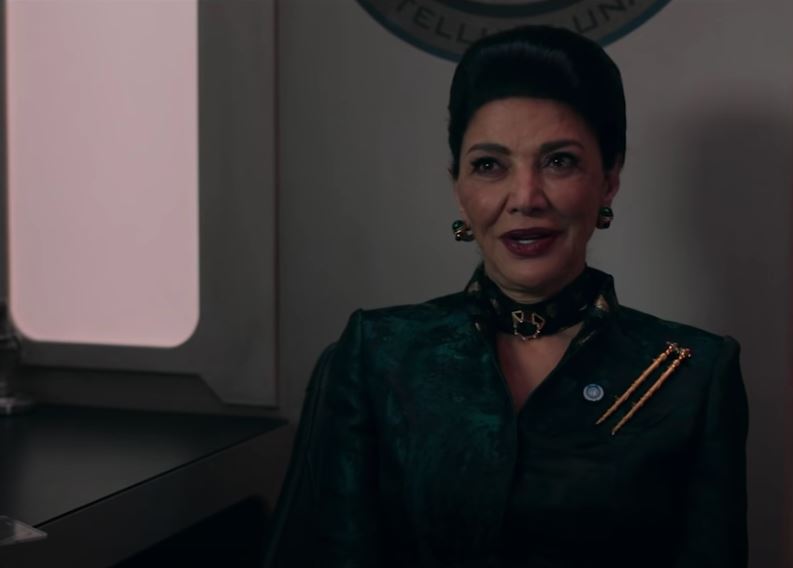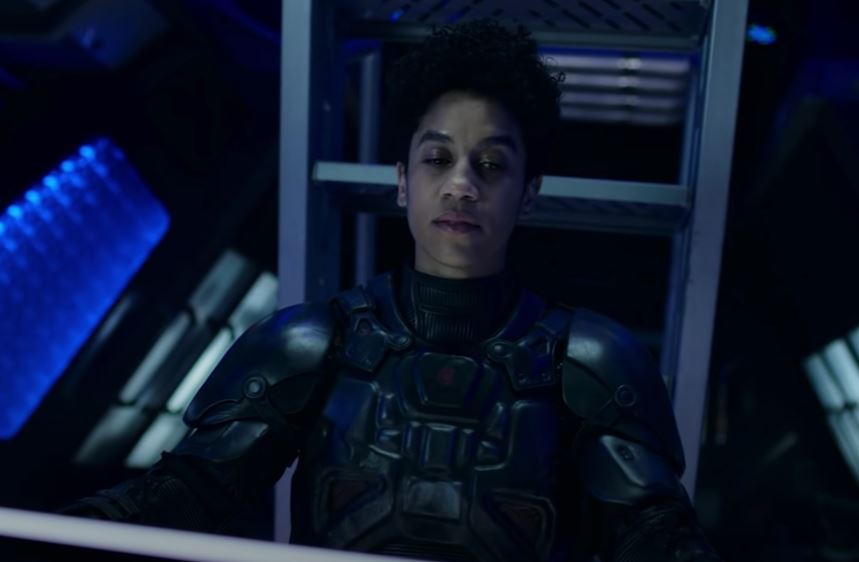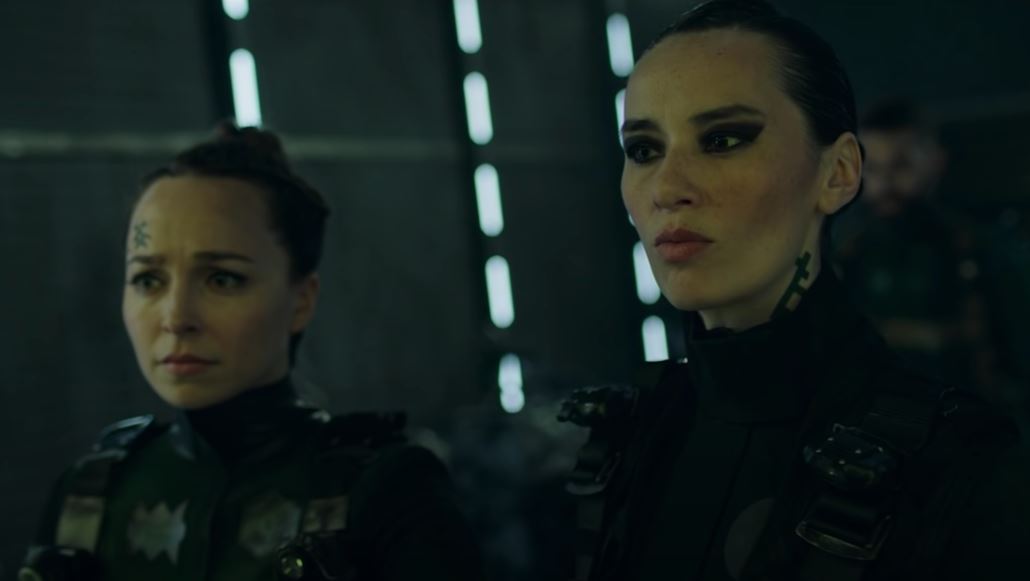Season 5 of The Expanse was the death of many things in its fictional universe. It was the end of Earth for the foreseeable future and Mars as we know it, as well as their eras of dominance. The rings made for the end of the solar system as the center of humanity. Alex’s death ended the Roci crew as we knew it.
Understandably, season 6 spent a great deal of time on the ramifications of these endings. Grief permeates so many scenes as everyone, from the smallest to the mightiest, struggle to deal with their losses. And along the way, The Expanse hit every stage of grief as it moved towards its conclusion, one that naturally could allow life in the universe to ever return to the way it once was.

Denial
There was so, so much denial among the characters of The Expanse about these permanent changes to their lives. The most evident example comes from the efforts of Earth and Mars to restore “order” to the system by defeating Marco Inaros’s Belter uprising. They seem to think things can return to normal if they just defeat this one man.
In reality, there is no going back. Earth is in the equivalent of a nuclear winter. The Rings opening doomed Mars regardless of anything Inaros did. Even if they managed to somehow suppress the Belters again, well, they cannot really keep them from going through the Rings. And even if Earth can eventually heal itself from the damage of the asteroid attacks, its power will be irreparably weakened by the millions of refugees who will leave for something better in the thousands of possible new home planets out there, just like all those leaving Mars for something easier than spending who knows how long terraforming the planet.
There are also more personal denials within the season. Filip was in denial because inability to mentally cope with his role in the asteroid attacks, and the evil of his father. The little girl on Laconia was in denial over the death of her brother. Naomi was in a sort of denial over her ability to cope with fighting Belters, and especially the very real chance that Filip would die.
Everything changed, and many characters on The Expanse simply could not acknowledge it.
Anger
Along with those changes came a lot of anger. Filip is the most prominent example of this stage of grief. He was increasingly unable to handle the asteroid attacks on Earth, and his go-to reaction to his grief over it was anger. He lashed out at everyone and everything. Season 6 sees him murder a friend out of anger and consistently throw tantrums at those around him
Camina Drummer’s opposition to Marco Inaros also came from deep fury over his murders of Ashford and Fred Johnson, as well as his attempt to kill Naomi. She knew she was hopelessly outmatched. She knew things would never go back to how they were and that Marco accomplished things Drummer also dreamed of for Belters. As the ending showed, she still held those dreams of freedom, power, and Belter equality that Marco afforded the Belt. On a more rational level, she knew siding with him was the smart play, which is why she initially went along with him.
She just could not let go of her anger over Marco attacking people she cares about, though, and her grief over their deaths. Drummer never had a plan to really win against Marco. She simply wanted to inflict as much damage and take as much away as she could before Marco caught up to her.
Add in the bitter snapping and cold moods the Roci crew had towards each other due to Alex’s death and you have quite a bit of anger.

Bargaining
For those without much in the way of real power in The Expanse’s vast setting, all they can try to do is bargain for what remains to them. The most prominent example of this in season 6 occurred with the predicament on Ceres Station.
With the station first overtaken by Marco, then abandoned and left for the Earth/Martian forces to take over, Ceres was left to try and bargain with each side to try and survive a situation it could not survive. Belter stations were established to expand the power of the Inners, and to help support them. They are resource stations, and with the inescapable death of Earth and Mars, they will no longer serve the purpose they once did. Belters will continue to move towards the worlds beyond the Rings, and Belter importance will continue to move to the Void at the center of the Rings, leaving the Sol stations increasingly abandoned and without purpose.
There are too many people who simply have no easy way off of Ceres, though, and they were trying to bargain for their survival. With the Inners and the Belters using the station as a pawn in their larger game, that survival window shortened considerably. They were left simply bargaining for the food and water necessary to survive weeks, let alone the inescapable generations ahead that will kill Ceres, and every station like it.
The old way of life has died, and Belters can do no more to save it than Earth or Mars, no matter how they try.
Depression
As much as anything, you can feel the overwhelming weight of depression over everything that happened, not just in seasons 5 and 6 but throughout the entire course of The Expanse. Those along for the entire ride neared the limit of the grief they were capable of bearing on their shoulders.
This was most prevalent with the crew of the Roci, as they each withdrew into themselves in the aftermath of season 5 and Alex’s death. Rather than mourn together and come to some sense of peace and acceptance over what happened, they each fruitlessly approached it in their own way and fractured apart, largely because they were thrust further into the conflict between the Inners and Belters.
You can see this same weary depression in Avasarala’s efforts to lead what remains of Earth and bring Marco to justice. She still has that Chrisjen spark in her, but not with the same fervor that once existed. She has simply seen and lost too much. Avasarala is still trying to mourn her husband, after all. She can’t because now she’s leading Earth and fighting a losing battle to keep Earth from collapsing.
Avasarala’s efforts to unite with the Belt was largely because she had nothing left to sustain her pride, or the love of the game she once basked in. She simply did this all for too long and it all caught up to her.
So many people suffered for this new conflict, whether from the people they’ve lost, the homes that are gone, or that larger sense of how things have forever changed.
Acceptance
Arriving at acceptance will be tough for most of these characters. Some reached a level of it. For all her anger, Drummer accepted what was needed to stop Marco and carve something new out for the Belt. Amos has acceptance of grieving moments down to a science after everything he has been through. For all her depression, and the fact she leads the Earth forces who did not realize their reality is forever changed, Avasarala realized for multiple seasons now what opening the Rings meant, and why they changed everything.
The Laconian movement was led by Martians who realized the same thing and immediately moved to take advantage, and Duarte’s monologue to Cara was largely to this tune. He grieved for Mars before accepting its fate.
Most harrowing of all was the scene where Naomi pushes the button that kills Marco and, she thinks at the time, her son Filip. It is a decision she struggles towards all season, and a necessity she tries to convince herself of, but you never know if she can truly let it happen. Her reaction to the destruction of Marco’s ship is one of the rawest, most visceral scenes in the entirety of The Expanse, and shows how acceptance comes with a traumatic price sometimes.
Still, season 6 was a struggle for an acceptance that some still had not reached by the end. I mean, how can the UN and Mars accept this new Belter power through the Transport Union? How can the Martian navy just accept that Mars is already dead? Will the Belt accept a truce with the Inners, or continue the fight out of anger and distrust? How will all these characters continue to process the losses they have sustained over 6 seasons?
It will not be easy. In some cases, the acceptance stage will be impossible.

The running subplot with Cara on Laconia embodies this larger theme running throughout the season. She was in denial about the death of the animal she accidentally killed with her food, and runs to her parents to fix it. When there is nothing to do, she lashed out at the world around her. She was depressed over this death, and then the even more tragic death of her younger brother. Because of whatever did bring the dead animal back to life, she bargained for her brother’s life. In the end, she may not even get a chance at acceptance.
And that inability to reach acceptance is a real, awful part of grief sometimes.
It’s a legitimate criticism to point out how narratively disconnected Laconia was from the larger conflict of The Expanse, and how we did not get anything remotely close to a satisfying ending regarding the planet, but Cara’s grief wonderfully paralleled the larger struggle of the galaxy. No matter the scale, there are responses to grief that humanity shares, and these responses often blend into each other in ways that make them inseparable. Even in the vastness of space, with entire planets on the line, people react the same way they would as a child when a beloved pet dies.
This very human connection grounds the best, most fantastical of stories in something real, and is an important reason why The Expanse is one of the best sci-fi series ever made.
Images Courtesy of Amazon
Have strong thoughts about this piece you need to share? Or maybe there’s something else on your mind you’re wanting to talk about with fellow Fandomentals? Head on over to our Community server to join in the conversation!

